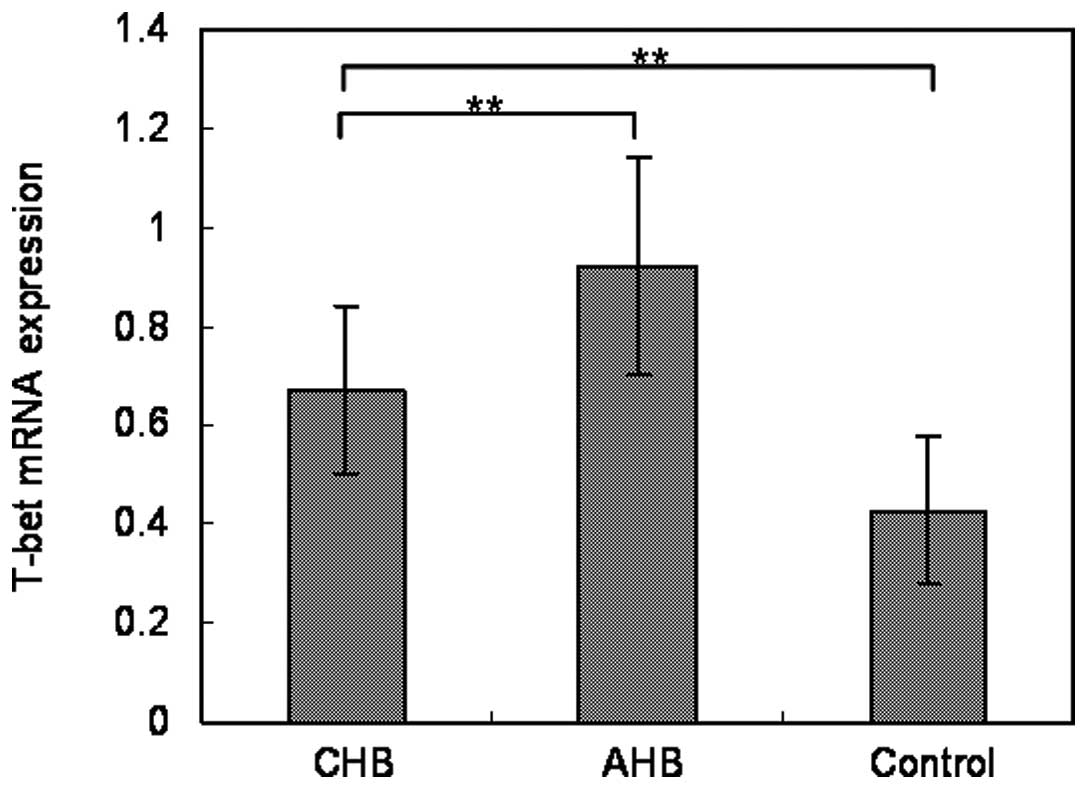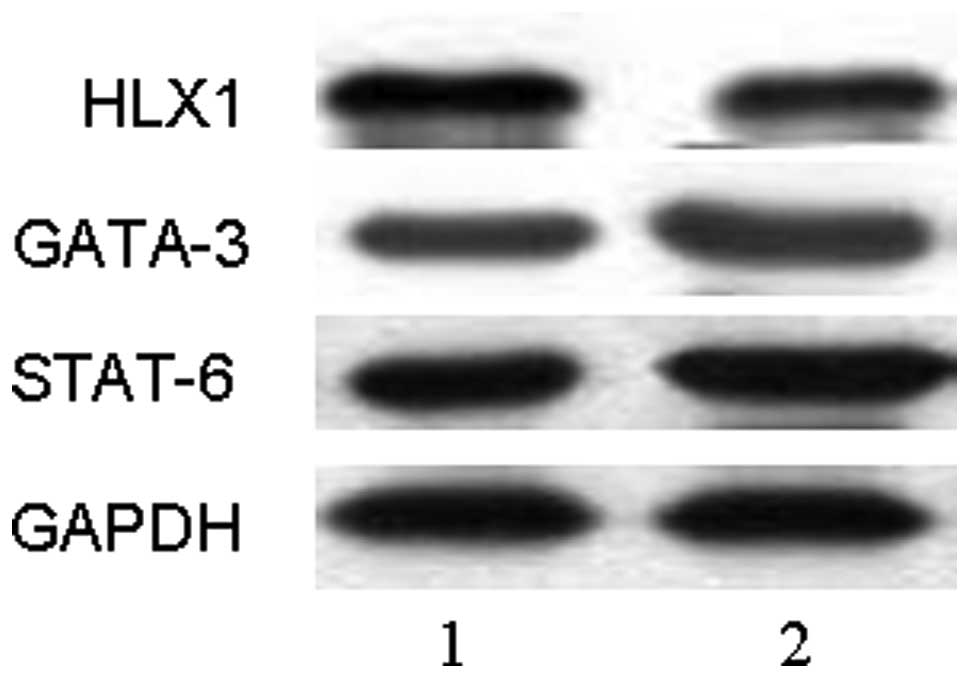|
1
|
Guidotti LG and Chisari FV: Immunobiology
and pathogenesis of viral hepatitis. Annu Rev Pathol. 1:23–61.
2006. View Article : Google Scholar : PubMed/NCBI
|
|
2
|
Asabe S, Wieland SF, Chattopadhyay PK, et
al: The size of the viral inoculum contributes to the outcome of
hepatitis B virus infection. J Virol. 83:9652–9662. 2009.
View Article : Google Scholar : PubMed/NCBI
|
|
3
|
Lewis MD, Miller SA, Miazgowicz MM, Beima
KM and Weinmann AS: T-bet’s ability to regulate individual target
genes requires the conserved T-box domain to recruit histone
methyltransferase activity and a separate family member-specific
transactivation domain. Mol Cell Biol. 27:8510–8521. 2007.
|
|
4
|
Beima KM, Miazgowicz MM, Lewis MD, Yan PS,
Huang TH and Weinmann AS: T-bet binding to newly identified target
gene promoters is cell type-independent but results in variable
context-dependent functional effects. J Biol Chem. 281:11992–12000.
2006. View Article : Google Scholar : PubMed/NCBI
|
|
5
|
Pai SY, Truitt ML and Ho IC: GATA-3
deficiency abrogates the development and maintenance of T helper
type 2 cells. Proc Natl Acad Sci USA. 101:1993–1998. 2004.
View Article : Google Scholar : PubMed/NCBI
|
|
6
|
Ansel KM, Djuretic I, Tanasa B and Rao A:
Regulation of Th2 differentiation and Il4 locus accessibility. Annu
Rev Immunol. 24:607–656. 2006. View Article : Google Scholar : PubMed/NCBI
|
|
7
|
Gutiérrez-García ML, Fernandez-Rodriguez
CM, Lledo-Navarro JL and Buhigas-Garcia I: Prevalence of occult
hepatitis B virus infection. World J Gastroenterol. 17:1538–1542.
2011.
|
|
8
|
Raimondo G, Pollicino T, Cacciola I and
Squadrito G: Occult hepatitis B virus infection. J Hepatol.
46:160–170. 2007. View Article : Google Scholar : PubMed/NCBI
|
|
9
|
Mizukoshi E, Sidney J, Livingston B, et
al: Cellular immune responses to the hepatitis B virus polymerase.
J Immunol. 173:5863–5871. 2004. View Article : Google Scholar : PubMed/NCBI
|
|
10
|
Brooks DG, Teyton L, Oldstone MB and
McGavern DB: Intrinsic functional dysregulation of CD4 T cells
occurs rapidly following persistent viral infection. J Virol.
79:10514–10527. 2005. View Article : Google Scholar : PubMed/NCBI
|
|
11
|
Jiang R, Feng X, Guo Y, et al: T helper
cells in patients with chronic hepatitis B virus infection. Chin
Med J (Engl). 115:422–424. 2002.PubMed/NCBI
|
|
12
|
Akpolat N, Yahsi S, Godekmerdan A,
Demirbag K and Yalniz M: Relationship between serum cytokine levels
and histopathological changes of liver in patients with hepatitis
B. World J Gastroenterol. 11:3260–3263. 2005. View Article : Google Scholar : PubMed/NCBI
|
|
13
|
Kao C, Oestreich KJ, Paley MA, et al:
Transcription factor T-bet represses expression of the inhibitory
receptor PD-1 and sustains virus-specific CD8+ T cell
responses during chronic infection. Nat Immunol. 12:663–671. 2011.
View Article : Google Scholar : PubMed/NCBI
|
|
14
|
Kootstra NA and Verma IM: Gene therapy
with viral vectors. World J Gastroenterol. 43:413–439.
2003.PubMed/NCBI
|
|
15
|
Montini E, Cesana D, Schmidt M, et al: The
genotoxic potential of retroviral vectors is strongly modulated by
vector design and integration site selection in a mouse model of
HSC gene therapy. Clin Invest. 119:964–975. 2009. View Article : Google Scholar : PubMed/NCBI
|
|
16
|
Abordo-Adesida E, Follenzi A, Barcia C, et
al: Stability of lentiviral vector-mediated transgene expression in
the brain in the presence of systemic antivector immune responses.
Hum Gene Ther. 16:741–751. 2005. View Article : Google Scholar : PubMed/NCBI
|
|
17
|
Mátrai J, Chuah MK and VandenDriessche T:
Recent advances in lentiviral vector development and applications.
Mol Ther. 18:477–490. 2010.
|
|
18
|
Meuer SC, Hussey RE, Cantrell DA, et al:
Triggering of the T3-Ti antigen-receptor complex results in clonal
T-cell proliferation through an interleukin 2-dependent autocrine
pathway. Proc Natl Acad Sci USA. 81:1509–1513. 1984. View Article : Google Scholar : PubMed/NCBI
|
|
19
|
Liao W, Lin JX, Wang L, Li P and Leonard
WJ: Modulation of cytokine receptors by IL-2 broadly regulates
differentiation into helper T cell lineages. Nat Immunol.
12:551–559. 2011. View
Article : Google Scholar : PubMed/NCBI
|
|
20
|
Zheng WP, Zhao Q, Zhao X, et al:
Up-regulation of Hlx in immature Th cells induces IFN-gamma
expression. J Immunol. 172:114–122. 2004. View Article : Google Scholar : PubMed/NCBI
|
|
21
|
Mullen AC, Hutchins AS, High FA, et al:
Hlx is induced by and genetically interacts with T-bet to promote
heritable T(H)1 gene induction. Nat Immunol. 3:652–658.
2002.PubMed/NCBI
|
|
22
|
Hamalainen-Laanaya HK, Kobie JJ, Chang C
and Zeng WP: Temporal and spatial changes of histone 3 K4
dimethylation at the IFN-gamma gene during Th1 and Th2 cell
differentiation. J Immunol. 179:6410–6415. 2007. View Article : Google Scholar : PubMed/NCBI
|
|
23
|
Farrar JD, Ouyang W, Löhning M, et al: An
instructive component in T helper cell type 2 (Th2) development
mediated by GATA-3. J Exp Med. 193:643–650. 2001. View Article : Google Scholar : PubMed/NCBI
|
|
24
|
Nawijn MC, Dingjan GM, Ferreira R, et al:
Enforced expression of GATA-3 in transgenic mice inhibits Th1
differentiation and induces the formation of a T1/ST2-expressing
Th2-committed T cell compartment in vivo. J Immunol. 167:724–732.
2001. View Article : Google Scholar : PubMed/NCBI
|
|
25
|
Skapenko A, Leipe J, Niesner U, et al:
GATA-3 in human T cell helper type 2 development. J Exp Med.
199:423–428. 2004. View Article : Google Scholar : PubMed/NCBI
|
|
26
|
Zhu J, Min B, Hu-Li J, et al: Conditional
deletion of Gata3 shows its essential function in T(H)1-T(H)2
responses. Nat Immunol. 5:1157–1165. 2004. View Article : Google Scholar : PubMed/NCBI
|
|
27
|
Hwang ES, Hong JH and Glimcher LH: IL-2
production in developing Th1 cells is regulated by
heterodimerization of RelA and T-bet and requires T-bet serine
residue 508. J Exp Med. 202:1289–1300. 2005. View Article : Google Scholar : PubMed/NCBI
|
|
28
|
Zhu J, Guo L, Watson CJ, Hu-Li J and Paul
WE: Stat6 is necessary and sufficient for IL-4’s role in Th2
differentiation and cell expansion. J Immunol. 166:7276–7281.
2001.
|
|
29
|
Goenka S and Kaplan MH: Transcriptional
regulation by STAT6. Immunol Res. 50:87–96. 2011. View Article : Google Scholar
|


















